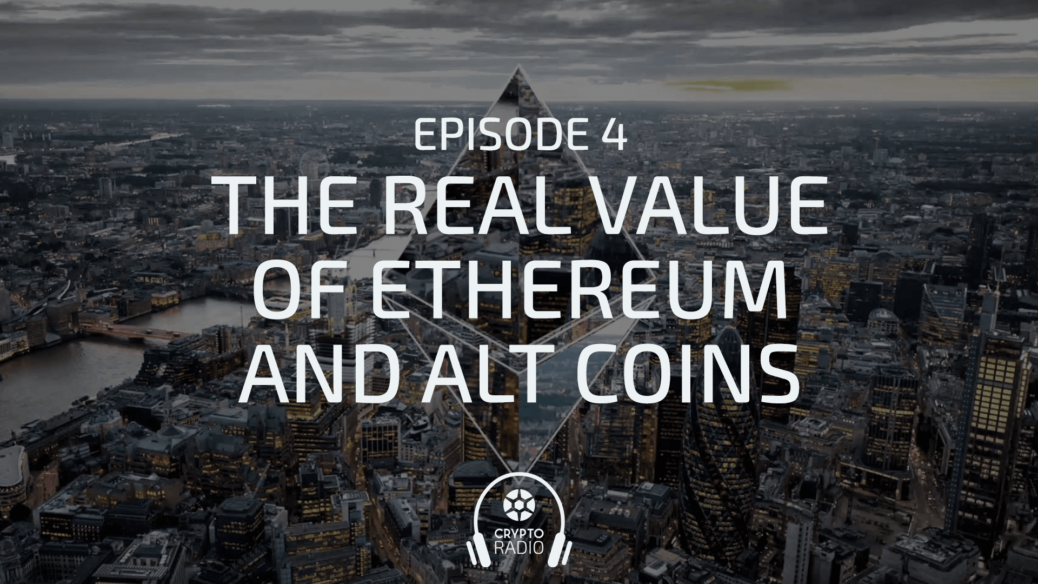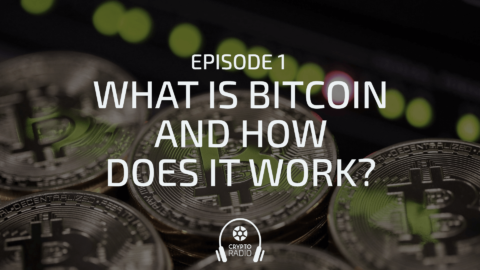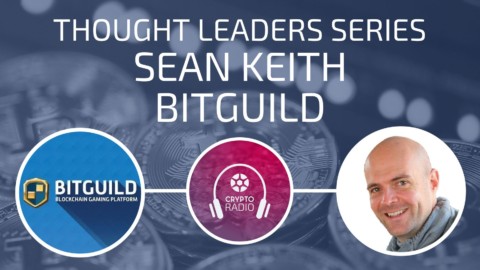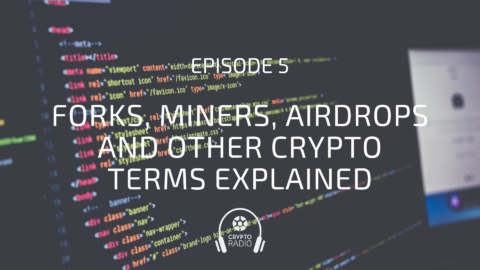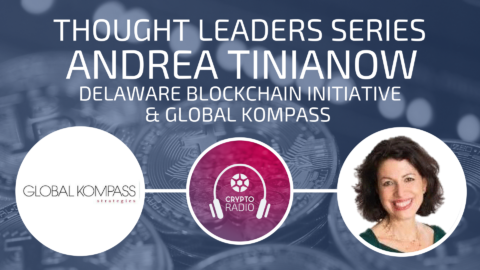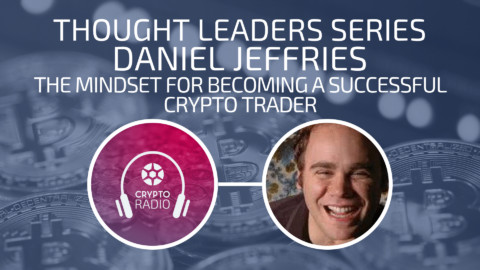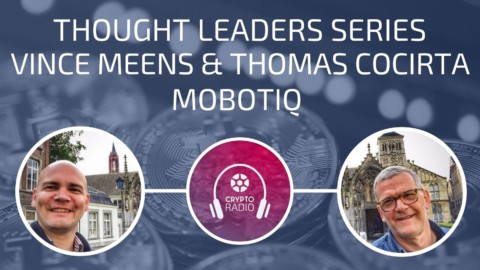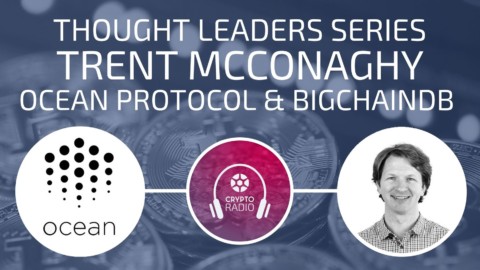Podcast: Play in new window | Download
[00:00:00] Mike Gilliand: Welcome to CryptoRadio. We interview top thinkers and entrepreneurs in the cryptocurrency and blockchain industry. We also cover topics like investing, trading and ICOs. We’re your hosts, Mike Gilliland, Michael Pole, Chris Parks, and Euvie Ivanova. We’re entrepreneurs, crypto investors and co-founders of a new blockchain investment platform called CoSyndicate.io. We created CoSyndicate and CryptoRadio to make crypto investing a better experience for you. In the first few episodes of this podcast, we’re going to cover the basics of [0:00:30] Bitcoin, blockchains and crypto investing. If you’re new to the space, these episodes are for you. If not, skip ahead to the episodes where we start to interview founders of blockchain projects and update you on all the news and important events in the crypto world. Over the next few episodes, we’re going to be running a contest to give you a chance to win over 3,000 dollars worth of prizes, including CoSyndicate tokens and a free membership to our private investment mastermind group. To learn how to participate, go to CryptoRadio.io.
Chris Sparks: Today, we’re going to talk about the basics [00:01:00] of the blockchain. In order to really understand anything that you’re going to put money towards, it’s obviously important to understand it from a fundamental level, but we’re just going to scrape the service a little bit here and just get right into what the blockchain is itself. So, Mike, Mike and Euvie, what actually is a blockchain?
Mike Gilliand: Okay, so what is blockchain? It’s a distributed database. So, if you think about the way information and money has traditionally been set up, it’s housed on a database that is owned by a person, a company or a government. It’s basically one set [00:01:30] of data, like, just a spreadsheet is basically all the databases. And one person owns it, so one person has generally access to edit the spreadsheet and keep it maintained. And it’s generally a very large central point of failure, so if you get hacked and someone gets access to it, that information can be changed, stolen. It’s a dangerous set up to have one single point of failure in the traditional database setup. What blockchain does is take a database and distribute it over multiple nodes, multiple [00:02:00] computers within a network, so you have copies of that same database that are now being synchronized with one another periodically, or as things are edited, or just constantly synchronized, constantly kept up to date with one another. And the mechanism that makes it safe from hacking is what requires consensus among all the nodes. So, if you make a transaction within the blockchain, you need to have consensus for the network to actually decide to make an update to the spreadsheet, to the database. So, all the network nodes need to agree that [00:02:30] a transaction has occurred. They validate that transaction, and then the spreadsheet is updated. That’s essentially what it is. How it’s… Maybe someone else wants to take the question of how it’s actually resilient.
Michael Pole: Yeah, so if you think about how currencies are normally issued, there is a sense of an institution like a government or Central Bank, and they’re in control of the issuance of the currency. So, everyone has to have trust and faith and confidence in them that they’re not going to cheat or lie or, you know, do any fraud. And this has kind of worked pretty well up to a point. I think right now, there’s a lot of problems with that trust and confidence in the current system. Fundamentally, blockchain and [00:03:00] Bitcoin solves that because you don’t need, you know, guaranteed faith of a central institution because of how all the nodes are holding information. It’s also very hard to take down that system because the distribution means you can really take down, you know, some of the network, but the rest of the network is still up and communicating, and that system is always running. So, unless you shut down the Internet, you know, for a sustained period of time, it’s very hard to actually hack into Bitcoin. Also ’cause it’s, you know, cryptographically secured. So, the amount of computing power that securing the network at this point is is the world’s most powerful supercomputer in essence. So, it [00:03:30] would just take an incredible amount of resources, and at this point, hasn’t been done yet. So, if someone could hack Bitcoin, they could have, what, 150 billion dollars right now? So, it’s a big incentive to do that. It just hasn’t happened yet. But, I think, yeah, the basic concept is, you know, you have these blocks. They’re like a ledger of accounting, a record of accounting, and is very similar to how currencies are issued. Just doesn’t have any faith in any Central institution.
Euvie Ivanova: There’s a really good article by Daniel Jeffries that talks about why Bitcoin is so revolutionary and blockchain is so revolutionary. And he talks about it in terms of triple entry [00:04:00] accounting. If you look at the history of how we did accounting as humankind, at first, when we were just hunter-gatherers, it was enough to have just one person keeping the records because you hunted a certain amount and you gathered the certain amount and that was it. But, then came in trade, and so then you had two tribes trading between each other. Each tribe needed to keep a copy of the records, so that neither of the tribes would cheat, so that they could both agree on what was traded, how many goods were exchanged, etc. So, [00:04:30] most systems today still run on this double-entry accounting system. Both sides keep a copy of the records, but what can happen in this case is that two parties can collude, do some shady deal, and nobody else knows about it. And we see this all the time with big corporations and with international trades. These deals going on that are actually really not beneficial for the rest of the world, but they’re beneficial for the two parties doing the deal. So, what triple entry [00:05:00] accounting does is it has a third party that is not involved in the deal also keeping a record of all the transactions and checking all the transactions. So, this is what the blockchain does. Everything becomes transparent…
Mike Gilliand: Because the blockchain’s the third entry. It’s the third copy of the ledger. So, you would have your individual copy, the person you’re doing a deal with would have their copy, then the blockchain is basically the third party. Impartial record.
Michael Pole: And I think in traditional trade, that third party, that sort of counterparty, has always been the financial intermediary. [00:05:30] So, that’s like the central bank, or the broker or the clearing broker, who act as that sort of trusted third party. But, obviously today, we have a lot of corruption and fraud going on in that space too, so I think it’s the human nature. You know, corruption is very easy when there’s enough money involved, and blockchain obviously removes that human element from that third party.
Mike Gilliand: So, why don’t we describe next what Ethereum is because Ethereum’s a whole other technology that is built on top of the blockchain. And it does a whole different thing than what Bitcoin does.
Michael Pole: So, we’re talking about smart contracts here. Yeah, so basically, I think if you look at the use case of [00:06:00] Bitcoin, it’s turned out to be very efficient transfer of value. I mean, it’s becoming obviously more expensive, has more demand on the network, but it’s limited to what it can actually do in terms of, you know, repeating and replicating what we have in the financial system today. So, there’s just all these transactions, all these databases happening that require a lot of business logic. So, that’s not something Bitcoin is redesigned to do. So, you know, if certain conditions are met, then execute a trade. That’s a very, you know, again a very traditional sort of role held by a broker, and Ethereum is basically able to do some of this logic with smart contracts. So, fundamentally, it has [00:06:30] a slightly different use case to Bitcoin. Some people also treat it as a cryptocurrency in terms of exchanging value with it because it’s slightly faster right now. But, I think its real value in terms of long-term is its ability to execute these smart contracts. And, obviously, Ethereum’s not the only one now. There’s, you know, there’s dozens of other sort of smart contract protocol layer coins trying to do the same thing and scale better with slightly different, you know, algorithms and protocols. So, that is really where I think Bitcoin right now is limited, and Ethereum has gained a lot of market share because it can do some of those things. And, obviously, you can start to build apps and things on top of that type of logic. [00:07:00] So, that’s really where the demand for Ethereum has blown up this year.
Chris Sparks: Yeah, again, like you said, it’s a race to scale. So, whoever gets there first with the ability to serve people at the same volume as, for example Visa, is going to win that race. And it’s also not a zero-sum game. There could be dozens and dozens of these platforms upon which people build their apps or dapps, but, basically, the best way to think about it is actually like a development platform, like iOS, or like Windows or Android. This is just sort of like the platform upon which people can build these [00:07:30] solutions to problems that we have in the real world using blockchain technology.
Mike Gilliand: In a way, because of the blockchain and Ethereum, you have this ability to make a world computer where anyone can decide to modify the operating system, or add new functionality to it with smart contracts. So, it’s an interesting thing to now have this prospect for a completely decentralized computer that maybe would be the basis of a new technology after that, like artificial intelligence. A lot of people are saying that artificial intelligence is going to require [00:08:00] having a blockchain to be safely operated.
Chris Sparks: Yeah, before we get too ahead of ourselves with Ethereum and dapps and things like these, before Ethereum came along, and some people consider Ethereum and altcoin, could you maybe talk a little bit about what altcoins are, where they came from and why?
Michael Pole: Yeah, sure. So, altcoins really, like, means alternative coins. It’s anything that’s referring to something that came after Bitcoin because in the beginning there was really just Bitcoin. So, Altcoin, you know, now kind of refers to all the other cryptocurrencies popping up as well, and I kind of break it down into big alts and junior alts. So, anything that’s kind of, you know, [00:08:30] already like a billion dollar market valuation, it’s already got a lot of trust, and it’s very established, whereas junior old coins are sort of, you know, smaller market cap coins that are very new and emerging. So, they all do slightly different things in terms of use cases. We mentioned Ethereum’s like a protocol layer of smart contracts. You have other altcoins that are more private blockchains, better for transferring value anonymously. You have other ones that are trying to integrate between fiat and cryptosystems to provide more liquidity and scale. So, there’s tons and tons of them now, all doing slightly different things. But, it refers to the rest of the ecosystems. Right now, [00:09:00] Bitcoin is around 50% of the market cap in terms of dominance, and around 50% is now made up of all these different altcoins.
Chris Sparks: So, there’s several different parts of altcoins, right? There’s the altcoins that came out between… So, say, starting in like 2012 that are like Litecoin, Dash, etc. And then you’ve got Ethereum, which kind of started changing the game because then you’ve got all these other more decentralized apps and other altcoins that came out, which we term ICOs.
Michael Pole: Well, those are called tokens. So, tokens is basically anything on top of, you know, Ethereum, blockchain or another blockchain like that. [00:09:30] So, when you say altcoins, for some people it’s just generic. It just means every other coin that’s not Bitcoin. But, yes, you’re right that some tokens are like derivatives of Ethereum essentially. They’re not their own blockchain. So, that’s a good distinction.
Chris Sparks: Exactly. So, I think the big point actually in the altcoin discussion is why it’s important, from an open-source perspective, that they’re able to exist. Because you can copy the code from Bitcoin, simplify it, and then have Litecoin. You can copy any of these open-source codes, and you can spin off your own technology or [00:10:00] coin. And it’s an immense amount of freedom that we’re giving to humanity as a whole because, basically, any problem you see in the world, you can take the code from one of these pre- existing technologies, and then build something to directly address that problem with a very direct solution.
Michael Pole: It’s the democratization of wealth basically. So, it’s totally voluntary. Anyone can create one, and as long as they create something of value, other people are free to use it. Obviously, the more people that use it, the more value it has. So, that’s just a natural organic evolution of currency as it should be, without any centralized control.
Mike Gilliand: You probably noticed a lot of new tokens pop up in the [00:10:30] last year or so, and after Ethereum launched a couple years ago, they’ve been working on basically creating a token standard. And, so, they’ve made it extremely easy to publish new tokens. I did it as an experiment just one day for fun. I know a little bit of code, and I’m definitely not an expert, and I did it in about five minutes with about, like, 20 lines of code. So, it’s super easy to do that.
Chris Sparks: Nice, that’s cool.
Euvie Ivanova: Some people are Bitcoin maximalist where they think that Bitcoin is the only legitimate cryptocurrency and it should be the [00:11:00] only one. And all the other ones are just crap. But, I think that’s shortsighted because one cryptocurrency might be really good at one specific application, and another cryptocurrency that has different features might be really good at for something else. So, it’s like saying, broccoli is the superior food. All of us should eat only broccoli all day long. That’s ridiculous, right? You have different foods that contain different vitamins. And it’s the same as with these altcoins.
Michael Pole: Yeah, and also the principle of cryptocurrencies is decentralization. So, it it’s all centralized into one blockchain, that wouldn’t make a lot of sense either.
Chris Sparks: Yeah, [00:11:30] definitely. And I think also that the market will eventually kind of come out in the wash, and the market will let us know which one is the most applicable, hopefully without any government influence.
Mike Gilliand: It’s totally going to be easy like I said, to keep pumping out these new currencies. And lots of different companies are going to be doing their own token sales and creating new tokens. But, I think, over time, anything that’s just duplicating functionality of existing tokens, people will generally pick a winner. I don’t know, maybe you can chime in on this Mike. What do you think about coins that are accomplishing the exact same [00:12:00] tasks? Like do you think they’re going to die out? Do you think they’re both going to rise?
Michael Pole: I think it’s free market capitalism. The market will decide which ones have more value, and, obviously, everyone’s free to compete. While, as an investor, you might want to avoid, you know, certain sectors, which are quite saturated. So, like, the crypto card payment space right now, it seems to me very saturated. I wouldn’t invest in that necessarily. But I don’t think it’s a bad thing to have competition. I think the more, the better, and anyone’s free to come along and do it better. So, that’s the whole, you know, the whole goal.
Euvie Ivanova: And also the point about, you know, the first-mover advantage. Yes, that’s definitely true, but that doesn’t mean that the thing that’s the first and [00:12:30] gains the most market share early on is necessarily going to be the thing that lasts. It’s the example of Myspace. Myspace, at its peak, was the biggest social network, and people thought that that was going to be the thing, but then Facebook came along, and everybody switched to Facebook because it did certain things better. And Myspace is just, you know, faded Into obscurity. I can see the same thing happening with cryptocurrencies, you know. It’s very likely that Bitcoin and Ethereum are just, you know, the first iteration of whatever they try to do, [00:13:00] and somebody will do it better in the future.
Michael Pole: I think governance is another key issue to look at here. If you look at how Bitcoin is governed, in terms of the technology, the protocol, there’s definitely some issues around there, and it keeps forking. And there’s all kinds of uncertainty around how that process is going to work long-term, so there’s some benefits to it being totally decentralized and there’s no central, you know, governance. But, at the same time, other structures that have better governance may be better to do other sort of, you know, use cases. So, it’s just different problems, different solutions. Different coins will do those differently.
Chris Sparks: Yeah. I like what you were saying, Euvie, about sort of… If you have a longitudinal aspect or way of thinking about [00:13:30] these things, try explaining to someone right now that Facebook isn’t going to exist in 20 years. It’s highly likely that it won’t. It won’t, at least, be used in the same capacity that we’re using it right now. But, you know, it’s just a question of how long term are you thinking and in technology. It’s exciting to think that there’s going to be something completely different and new and exciting to replace Facebook. And it’s also interesting to sort of see it try and maintain as much market share and influence as possible right now, but with net neutrality having been demolished two days [00:14:00] ago.
Mike Gilliand: I think we’re also switching into a different way to think about data in ownership, and that’s going to affect everything now that we have this technology, the blockchain. So, things like Facebook owning and selling your data, there could easily be, in the next few years, the development of a new social media that’s run on the blockchain, owned by nobody. That way, different nefarious activities you don’t want to happen with your data, the selling of it to advertisers, or the leaking of it to government entities, that could be completely avoided. There’s other things like Airbnb or different platform services that take a very large [00:14:30] percentage of a transaction between peers, that could be eliminated as well. So, you could have peer-to-peer value transaction in any type of service. Uber, Airbnb, the list goes on. So, that’s another aspect of the blockchain that a lot of people who are developing now are thinking about, but the general public is not thinking about this yet. So, any kind of institution or entity that has power over your data is going to experience a big flip in the next, I would say, one to five years.
Chris Sparks: And you see them influencing policy to try and avoid that [00:15:00] situation right now.
Mike Gilliand: Definitely. The whole net neutrality thing, that’s a huge example right now. It’s huge in the news, and what does it take to make that whole conversation irrelevant? A decentralized distributed Internet, some sort of new type of Internet built on the blockchain, maybe what Google is doing with the Loon Project, you know? Blimps flying around the earth, that sort of thing run on a protocol on the blockchain could eliminate throttling of Internet speeds that are being attempted right now by Comcast and all of these other telecom companies.
Chris Sparks: Anyone in the audience who has no idea what we’re talking about. [00:15:30] Net neutrality was basically something that was set up in 2015 by Obama to protect consumers against… What’s the word? Throttling or selectively limiting accessibility of certain websites, or giving preference to certain companies over others, and charging people basically to access websites. Let’s boil it down to that for simplicity. And then three days ago, in December 14th, it was struck down by the FCC, and this is very, kind of, characteristic of regulators. [00:16:00] They like to go for the single point of failure, which in this case, is the ISPs, the internet service providers. And they can control these companies, and there’s two in the US really. There’s, like, Verizon and Comcast, which is insane that there’s only two anyway. So, one proposed solution is Google’s Loon Project where you have blimps flying around the earth, providing Internet and wifi to humanity as a whole. And then what I really like is Elon musk’s satellite project where he would launch 4,000 satellites into the atmosphere, and have them, [00:16:30] basically, beaming wifi to every corner of the globe at all times.
Mike Gilliand: Cool. I haven’t heard of that one yet.
Chris Sparks: Yeah. I mean that, to me, sounds like… Got to do an ICO for that one. Easy. Or, like, could we think of a better thing for humanity to come together and do than wifi satellites?
Mike Gilliand: Thanks for listening to CryptoRadio. To get the show notes, links and other resources from this episode, go to CryptoRadio.io/4. To get a chance to win CoS tokens and a membership to our private mastermind group for investors, go to [00:17:00] CryptoRadio.io/contest. And if you liked this episode, don’t forget to leave a review and give us a 5-star rating at CryptoRadio.io/reviews. Thanks for listening, and we’ll see you in the next episode.
This episode is part 4 of our introductory series to cryptocurrency.
Introduction to Blockchain, Ethereum & Alt Coins
In this episode, we will cover:
- What is the blockchain?
- What makes blockchain different from previous financial systems?
- The revolutionary idea of triple entry accounting
- What is Ethereum?
- What are alt coins?
- What are tokens?
- What is the potential applications of blockchain technology for the future?
Resources:
- The Most Mind-Blowing Feature of Cryptocurrency by Daniel Jeffries
- Interview with Vitalik Buterin, founder of Ethereum
- More in-depth blockchain podcasts & videos from Future Thinkers

